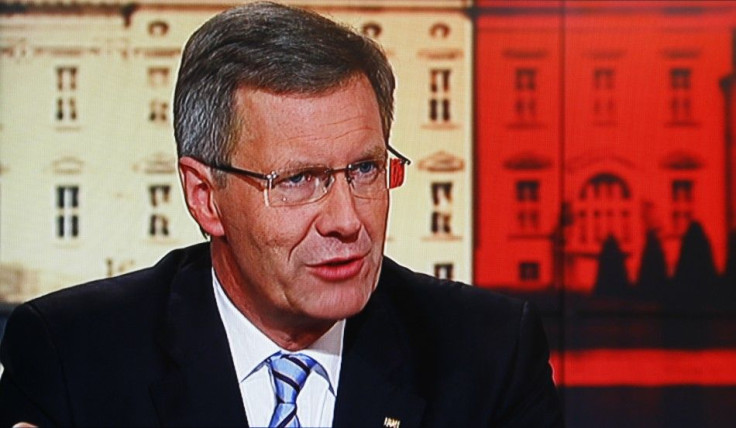German President to Discuss Loan Scandal

As if being tasked with solving the Eurozone debt crisis is not job enough, German Chancellor Angela Merkel now has to defend her choice of Christian Wulff for president as information has emerged that he tried to prevent media from reporting about his private business dealings.
Wulff -- a senior member of Merkel's Christian Democratic Union Party and nominated by the chancellor for the presidency in 2010 -- reportedly left a voicemail message last month on the mobile phone of Kai Diekmann, Bild's newspaper editor, threatening war if the newspaper disclosed an unusual personal loan that Wulff had received from the family of a German entrepreneur, The New York Times reported.
The loan was to finance the purchase of his home in 2008, when he was still governor of the state of Lower Saxony, Bild reported. Wulff acknowledged accepting a low-interest loan of 500,000 euros ($650,000 at today's rate) from the wife of a friend, a local businessman named Egon Geerkens. After the exchange became known last month, Wulff refinanced the loan through a bank and paid back the Geerkens.
Ignoring the threat, Bild published the story anyway, quickly resulting in a maelstrom of media reports and calls for Wulff's resignation. The news of the president's call to the editor was first reported by two rival German newspapers, Süddeutsche Zeitung and Frankfurter Allgemeine Sonntagszeitung.
The role of president is a largely ceremonial office, but nonetheless taken very seriously by Germans, as the president is supposed to be a moral authority who defends the constitutional laws, including a commitment to freedom of the press.
In a statement on Monday, Wulff neither confirmed nor denied the allegations; he is said to be giving a television interview later on Wednesday.
Freedom of the press is an important value for the president, his office said But the president categorically declines to discuss off-the-record conversations and telephone calls.
The scandal puts pressure on Merkel, as calls for Wulff's resignation abound amid declarations of his inability to continue fulfilling his duty; if he does resign, some say it will reflect poorly on Merkel, as he was her choice.
The attack on press freedom is unbearable, Erwin Lotter, a lawmaker from the Free Democratic Party, Merkel's junior coalition partner, said in an interview. Wulff has become intolerable once and for all. The president should be able to comment on ethical and moral questions concerning society. That requires a particularly high degree of credibility.
Wulff's resignation would be the second by the country's president in two years. In May 2010, former President Horst Koehler abruptly stepped down after appearing to suggest German troops abroad were defending Berlin's economic interests. Merkel's move to nominate Wulff was a political calculation, analysts say, another example of how she successfully sidelined a potential threat, The Wall Street Journal reported.
Her cold power politics pushed out a respected and experienced president and replaced him with a politically and personally immature career politician, Werner Marnette, a former CDU economy minister in Schleswig Holstein, told Handlesblatt Online.
In the first round of parliamentary confirmation vote, more than 40 members of Merkel's own party had voted against Wulff.
© Copyright IBTimes 2025. All rights reserved.





















